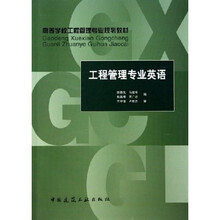高等学校工程管理专业规划教材:工程管理专业英语

目 录内容简介
Chapter 1 The Owners Perspective 1.1 The Project Life Cycle 1.2 Major Types of Construction 1.3 Selection of Professional Services 1.4 Construction ContractorsChapter 2 Organizing for Project Management 2.1 What is Project Management? 2.2 Professional Construction Management 2.3 Leadership and Motivation for the Project Team 2.4 Perceptions of Owners and ContractorsChapter 3 The Design and Construction Process 3.1 Design and Construction as an Integrated System 3.2 Design Methodology 3.3 Functional Design 3.4 Construction PlanningChapter 4 Labor, Material and Equipment Utilization 4.1 Factors Affecting Job-Site Productivity 4.2 Material Procurement and Delivery 4.3 Construction Equipment 4.4 Queues and Resource BottlenecksChapter 5 Cost Estimation 5.1 Approaches to Cost Estimation 5.2 Types of Construction Cost Estimates 5.3 Unit Cost Method of Estimation 5.4 Cost IndicesChapter 6 Economic Evaluation of Facility Investments 6.1 Basic Concepts of Economic Evaluation 6.2 Investment Profit Measures 6.3 Methods of Economic Evaluation 6.4 Public Versus Private Ownership of FacilitiesChapter 7 Financing of Constructed Facilities 7.1 The Financing Problem 7.2 Institutional Arrangements for Facility Financing 7.3 Project versus Corporate Finance 7.4 Shifting Financial Burdens 7.5 Construction Financing for ContractorsChapter 8 Construction Pricing and Contracting 8.1 Pricing for Constructed Facilities 8.2 Contract Provisions for Risk Allocation 8.3 Types of Construction Contracts 8.4 Resolution of Contract Disputes 8.5 Negotiation Simulation: An ExampleChapter 9 Construction Planning 9.1 Basic Concepts in the Development of Construction Plans 9.2 Choice of Technology and Construction Method 9.3 Defining Work Tasks 9.4 Defining Precedence Relationships Among ActivitiesChapter 10 Fundamental Scheduling Procedures 10.1 Relevance of Construction Schedules 10.2 The Critical Path Method 10.3 Activity Float and Schedules 10.4 Presenting Project SchedulesChapter 11 Advanced Scheduling Techniques 11.1 Scheduling with Uncertain Durations 11.2 Scheduling in Poorly Structured Problems 11.3 Calculations for Monte Carlo Schedule Simulation 11.4 Improving the Scheduling ProcessChapter 12 Cost Control, Monitoring and Accounting 12.1 The Cost Control Problem 12.2 Forecasting for Activity Cost Control 12.3 Schedule and Budget Updates 12.4 Relating Cost and Schedule InformationChapter 13 Quality Control and Safety During Construction 13.1 Quality and Safety Concerns in Construction 13.2 Total Quality Control 13.3 Quality Control by Statistical Methods 13.4 SafetyChapter 14 Organization and Use of Project Information 14.1 Types of Project Information 14.2 Computerized Organization and Use of Information 14.3 Relational Model of Databases 14.4 Information Transfer and FlowReference 1.2 Major Types of Construction 2.1 What is Project Management? 3.4 Construction Planning 4.2 Material Procurement and Delivery 5.1 Approaches to Cost Estimation 6.1 Basic Concepts of Economic Evaluation 7.1 The Financing Problem 8.2 Contract Provisions for Risk Allocation 9.2 Choice of Technology and Construction Method 10.1 Relevance of Construction Schedules 11.2 Scheduling in Poorly Structured Problems 12.1 The Cost Control Problem 13.2 Total Quality Control 14.1 Types of Project Information
目 录内容简介
《工程管理专业英语》中涵盖了包括项目管理组织、投资项目的经济评价、建设工程项目融资等诸多内容在内的工程项目管理领域的理论体系和方法论的精粹,并附有几乎所有的工程管理专业术语和专有表达,是对学生有关专业课知识的最好补充。此外,还能够使读者对于工程管理的理论体系有一个系统而全面的认识。
比价列表
公众号、微信群
 缺书网
缺书网微信公众号
 扫码进群
扫码进群实时获取购书优惠






